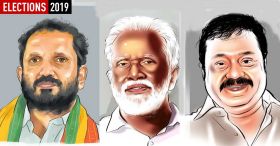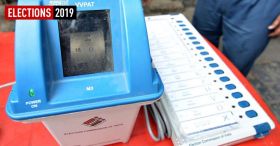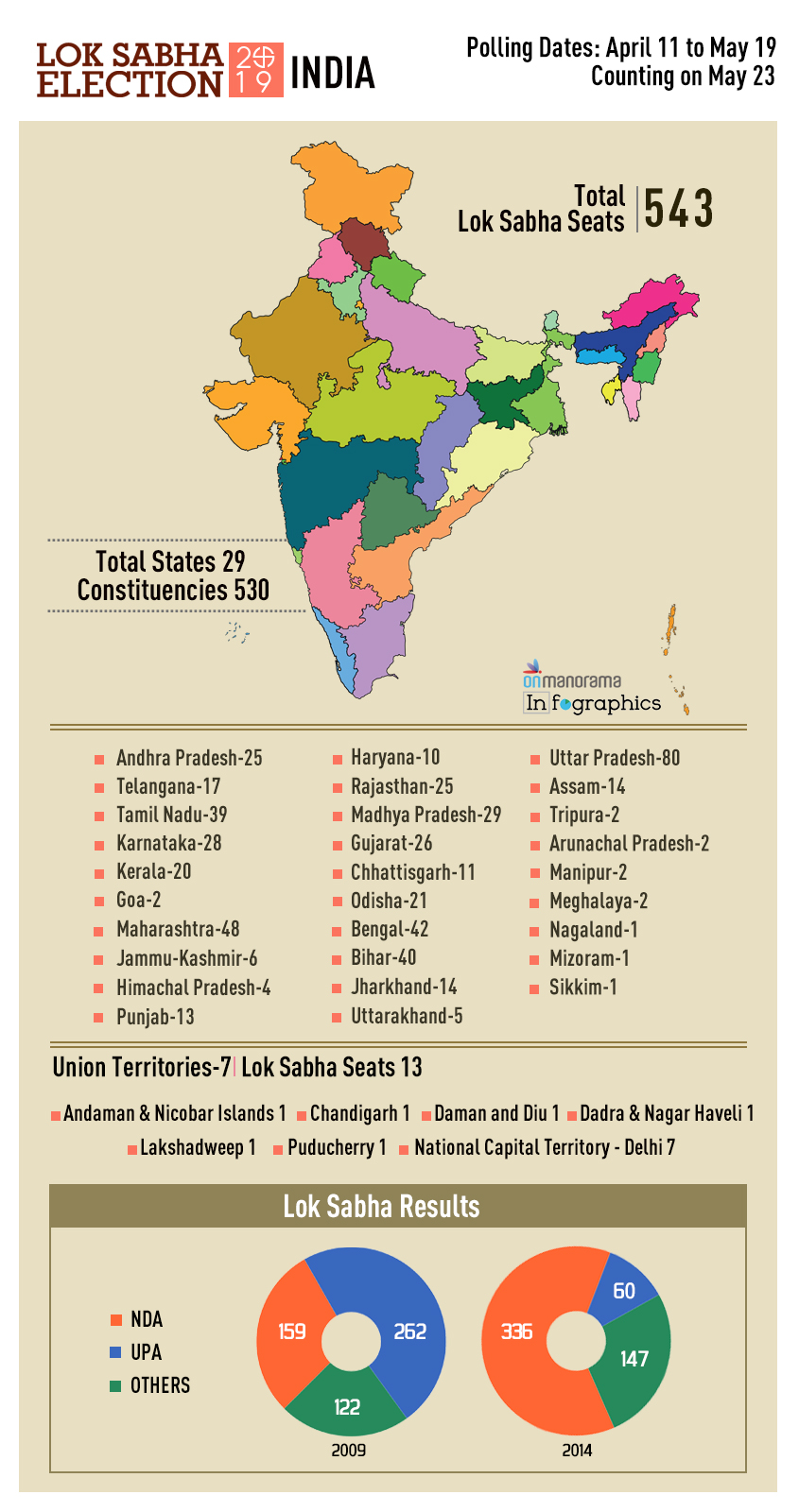
New Delhi: Prime Minister Narendra Modi on Thursday led his Bharatiya Janata Party towards a super-sized victory for a second term in office, as his message of nationalism, security, Hindu pride and a New India was wholeheartedly embraced by voters across large swathes of the country.
With the elections establishing the 68-year-old Modi as the most popular leader in decades, the partial vote count released by the Election Commission showed that BJP will not only surpass its 2014 performance but also cross 300 seats on its own.
The euphoria of the victory was capped by a sombre speech by Modi in which he promised to devote "every moment of my life and every fibre of my body" to the welfare of the nation. He also vowed that he will never do anything with ill-intention, nor will he do anything to enrich himself.
"Whenever you judge me, judge me on these three parameters. If I fall short on these, curse me. But I assure my countrymen that what I have said in public I will do my best to fulfil," he said.
Striking a conciliatory political tone, he also reached out to his rivals, urging everyone to put the rancour of the bitter and often nasty campaign behind them. What's past is past, he said.
"We have to move ahead. We have to take everyone with us, even our opponents. We have to work for the benefit of the country," he said. "You have filled this fakir's bag with a lot of hope. All your hopes, dreams, ambitions are dependent on it," he said.
Until 11.00 pm, the BJP had won 194 seats and was leading in 109 of the 542 Lok Sabha seats that went to polls in seven phases in April and May. It demolished the combined opposition with the Congress Party stuck at 39 confirmed victories and a lead in 13 seats, according to the partial results.
Modi easily won his seat in Varanasi with a margin of over 4.3 lakh votes while party president Amit Shah took Gandhinagar in their home state of Gujarat by over 5.5 lakh votes.
"With all + development for all + everybody's confidence = victorious India," Modi tweeted. "Together we grow. Together we prosper. Together we will build a strong and inclusive India. India wins yet again," he said.
Modi and Shah arrived at the party headquarters in New Delhi to a rapturous welcome by supporters. Modi waved victory signs with both arms in the air as rose petals were showered on the duo, the two most powerful men in the country. He then proceeded to garland the statues of BJP idealogue Deen Dayal Upadhyaya and Shyama Prasad Mukherjee. Minutes later, a gigantic garland in BJP colours of saffron and green was held around Modi by other dignitaries.
In the end, Modi's proclamation of "Ab ki baar 300 paar" just a few days ago looks set to come true as Congress president Rahul Gandhi's campaign slogan of "chowkidar chor hai" and promises of annual income guarantee found no resonance among voters. In almost all the states where BJP won, its vote share was more than 50 per cent.
The results have raised questions about Gandhi's leadership and his party's future. At a press conference, Gandhi refused to address that issue, saying the party will hold a meeting on Friday to discuss the future.
"The people of India have decided that Narendra Modi will be the PM again and I fully respect it," Gandhi told reporters. He also congratulated Modi and BJP, adding that today is not the day to go into the cause of the defeat but to respect the will of the people.
If the trends stay until final results, the BJP and its allies in the National Democratic Alliance will likely end up with 348 seats, up from 336 in 2014. The BJP, which is now tantalisingly close to the 300 mark in Lok Sabha, had won 282 seats on its own in the last election.
Congratulating Modi and party workers "for achieving this miraculous win," Finance Minister Arun Jaitley said "aspirational India does not accept royalties, dynasties and caste based parties."
The results are a ringing endorsement of Modi's popularity, his government's achievements in the last five years and his campaign, which centred around national security following the Balakot air strikes, nationalism and Hindutva. He also relentlessly attacked the Congress Party for what he called its dynastic legacy, and blamed it for the country's woes, including endemic corruption.
The opposition had criticised the BJP campaign as divisive and polarising.
Still, the results show that the Modi wave and the party's brilliant election management swept across geographies, caste lines, age, gender and economic status.
In the politically critical state of Uttar Pradesh, where the Samajwadi Party-Bahujan Samaj Party combine had posed a stiff challenge, the BJP is expected to win 62 of the 80 seats at stake. Although the BJP had won 71 seats in the last elections, the performance is far better than the 30-40 seats many exit polls had forecast.
The BJP state headquarters in Lucknow was drenched in saffron hue with jubilant party workers wearing saffron stoles, adorning 'genda' flowers around their necks and holding lotus cut outs. They also burst crackers and danced to drum beats as women supporters wore saffron attire and painted their nails in the same hue.
In a stark contrast, Congress, BSP and SP offices wore a forlorn look. Under the scorching sun, even shop owners selling campaign material outside the SP office sat in stunned silence as those gathered around the tea kiosks talked in hushed tones
Even Gandhi lost his seat in Amethi to BJP's Smriti Irani. He, however, won from Wayanad in Kerala.
"Congress party is feeling dejected," Congress spokesperson Jaiveer Shergill told reporters.
"Congress needs to introspect as to why its campaign failed to resonate with the people of the country," he said.
The Modi wave not only swept through the Hindi heartland and Gujarat, as was expected, but also bulldozed through West Bengal, Odisha, Maharashtra and Karnataka. Only Kerala, Tamil Nadu and Andhra Pradesh appeared untouched. Even in Telangana, where it was expected to fare poorly, the BJP is expected to win four seats (2 won), while the Telangana Rashtra Samiti will get nine.
However, Andhra Pradesh threw up a shock in the Assembly polls, which were held simultaneously, voting out of power the Telugu Desam Party of Chandrababu Naidu, and electing Jagan Mohan Reddy's YSR Congress.
After Jawaharlal Nehru and Manmohan Singh, Modi is the third prime minister of the country, and the first non-Congress one, who has been able to retain power for a second term with full majority in Lok Sabha.
The results were staggering for BJP in the Hindi-speaking states, including those where Congress had won in the recent Assembly elections: it swept all but one of the 29 seats in Madhya Pradesh, 24 out of 25 in Rajasthan and nine out of 11 in Chattisgarh.
Similar was the story in Bihar, Haryana, Himachal Pradesh, Uttarakhand, Maharashtra, Delhi and notably Karnataka, where it won 25 out of 28 seats.
"The people on the ground are not buying the narrative of the opposition that people are under threat. People are doing well that they are looking forward to the next government of Narendra Modi. We have to realise that Modi's government inherited very weak economy and he done very phenomenal job (in the last five years)," BJP's Amit Malviya said.
In Odisha, the BJP made huge gains, forging ahead in eight of the 21 seats while the Biju Janata Dal was ahead in 12 and Congress in 1. In 2014, the BJD had won 20 seats and BJP had taken one. Odisha also held simultaneous Assembly polls, in which the BJD is set to return to power, indicating that the voters chose smartly, opting for the status quo in both state and centre.
In West Bengal, a stronghold of Trinamool Congress Party, the BJP made terrific gains with 6 wins and leading 12, up from two in 2014, all at the expense of Left parties. The TMC won 12 and is leading in 10.
Congress ally DMK won 12 and was ahead in 11 seats in Tamil Nadu while in Kerala, the Congress-led UDF won 17 and were leading in 2 out of 20 seats.
In 2014, the BJP won 282 seats, leaving the Congress with an all-time low of 44 seats against the 206 it won in 2009.
The voting was staggered between April 11 and May 19 in which around 67 per cent of the nearly 900 million eligible people exercised their franchise to elect 542 members of the Lok Sabha from a total of 8,049 contestants. Out of the 543 Lok Sabha seats, elections were held in 542 constituencies as the EC had cancelled polls to the Vellore constituency on the ground of excessive use of money power.
Here's how the day unfolded.






